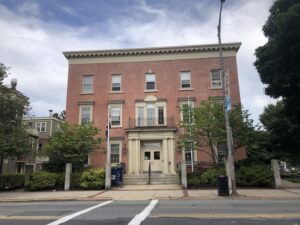Who is a member?
Our members are the local governments of Massachusetts and their elected and appointed leadership.

Using opioid settlement funds, the city of Beverly plans to hire a new health department employee to help residents access and navigate resources for people struggling with substance use disorder.
The Beverly City Council in February approved the use of national opioid settlement funds to create a new health department position dedicated to helping residents access and navigate resources available to those struggling with substance use disorder.
The city is expecting to receive $1.8 million over the next 14 years from the opioid settlement, and $107,020 from fiscal 2023 has been appropriated into a new opioid special revenue fund.
The new position is expected to have an initial annual salary of between $75,000 and $85,000.
“Everyone agreed that adding a position to the city would make a meaningful impact, having someone residents could reach out to directly to help navigate the services available,” said Health Director Laura DelleChiaie.
When determining how best to use the funds, Mayor Mike Cahill brought together DelleChiaie, the police chief and the schools superintendent.
“We looked at where we already have services related to mental health,” DelleChiaie said. “We had many assets within the public school system and a jail diversion program in the police department, and have a social worker with the Council on Aging, but we didn’t have a person dedicated to the general population, ages 18 to 59. They weren’t being directly served unless they had a kid in schools or were involved with the Police Department.”
In order to best determine how the substance use crisis was affecting the community, DelleChiaie said she looked to Beth Israel Lahey’s Community Health Needs Assessment from fiscal 2022. Hospitals are required to conduct the assessment every three years.
The assessment revealed that Beverly residents had a relatively high rate of substance use disorder-related inpatient discharges — 114 per 100,000 patients versus the state average of 53 per 100,000 patients — and related emergency room visits — 722 per 100,000 patients versus the state average of 343. Beverly’s mental health admissions for youths was also higher than the state average.
In addition to consulting with city departments, DelleChiaie consulted with the Be Healthy Beverly collaborative and built a diverse coalition to brainstorm possible uses for the funds. With additional support from the Board of Health and the City Council, Cahill approved her request and brought it to the council.
“Use and partner with the groups and coalitions already doing this work in your community to help you,” DelleChiaie recommended. “You’re going to get a lot of opinions from different backgrounds, which is great, but getting everyone to consensus is important — having the data to look at and see how this would work.”
The city also got about 100 responses to a community survey asking about how the settlement funds should be used. Responses were split between using the funds on treatment options and access to city resources, DelleChiaie said, so the new position was designed to help accomplish both, by assisting residents in accessing treatment and resources.
“The biggest asset for me … was getting all our offices on one page and agreeing that this is the best method,” DelleChiaie said.
The city is now advertising for the new position. The department is looking for someone with a background in social work, master’s level education, and licensure — ideally someone who is already in the field, or has experience in opioid use disorder. The city is also interested in candidates who are bi- or multilingual, but it is not a requirement.
“The position will be doing a lot of surveying in the community and an assessment of what resources we do have, and will keep track of that to help residents [as well as] building partnerships and advocacy in getting those residents what they need,” DelleChiaie said.
The city is also looking at using settlement funds to purchase naloxone boxes in key locations around the community.
DelleChiaie advised smaller communities that don’t get a lot in settlement funds to look into partnerships.
“That might work for smaller communities to partner up and combine funds to make a meaningful impact,” she said. “Substance use disorder doesn’t know geographic boundaries, if it’s happening in your community it’s happening in others.”